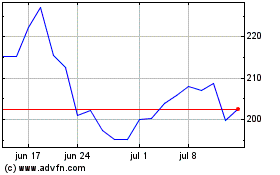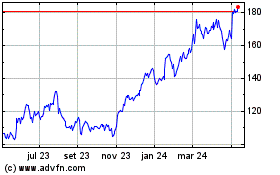Qualcomm Investors Register Protest -- WSJ
24 Março 2018 - 4:02AM
Dow Jones News
Six board members get tepid support in holder vote following
Broadcom ordeal
By David Benoit and Ted Greenwald
This article is being republished as part of our daily
reproduction of WSJ.com articles that also appeared in the U.S.
print edition of The Wall Street Journal (March 24, 2018).
Six of Qualcomm Inc.'s directors, including Chief Executive
Steve Mollenkopf, failed to win support from a majority of the
company's shares Friday, a significant protest vote that signals
investor discontent after the chip-making giant successfully
rebuffed a hostile takeover from Broadcom Ltd.
At the company's annual meeting in San Diego, just 40% to 50% of
the total shares outstanding were voted in favor of the six
directors, with the other four getting more than 50%, according to
a person familiar with the count.
An 11th director, former Chairman Paul Jacobs, wasn't nominated
to stand for re-election after a dispute with other board members
over his desire to make a bid for the company.
All the directors will remain on the board since they were
running unopposed after the U.S. government blocked Broadcom's bid,
and by extension its six-member slate of nominees. The vote count
for the originally scheduled meeting that would have pitted the
Broadcom slate against Qualcomm's nominees showed Broadcom winning
at least four seats and with a path to get up to six, people
familiar with the matter have said.
The latest numbers are preliminary -- a tally will be disclosed
next week -- and subject to change.
Qualcomm investors had raised concerns about the company's
performance and how it handled Broadcom's $117 billion takeover
offer -- with anxiety over the latter stoked by the revelation that
Qualcomm had prompted the government review that led to the order
from President Donald Trump blocking the deal. Institutional
Shareholder Services Inc. advised investors to continue to vote for
Broadcom's nominees even though they couldn't be elected, as a sign
of protest.
While no one will be forced off the board by Friday's vote, such
a lack of support for directors often increases pressure on
companies to make changes.
The vote tally could have been worse: In a contested election,
winning some 40% of the total shares is often sufficient to secure
victory given many shareholders don't vote.
The tumult on Qualcomm's board follows a period of high drama
that started in November when Broadcom announced an unsolicited bid
for the chip maker, which has suffered a series of regulatory fines
and customer revolts including a bitter legal battle with Apple
Inc. over patent royalties. Qualcomm stock is down by more than 10%
since Apple launched a barrage of lawsuits early last year.
Singapore-based Broadcom's takeover attempt fell apart when Mr.
Trump accepted a recommendation by the Committee on Foreign
Investment in the U.S. to block it. That recommendation followed a
petition by Qualcomm in January seeking a committee review of the
deal.
CFIUS, which oversees foreign acquisitions of U.S. companies,
found that Qualcomm's large investments in next-generation cellular
systems are critical to national security and that a takeover by
Broadcom, known for cost cutting and financial discipline, would
risk ceding U.S. technology leadership to Chinese companies,
particularly Huawei Technologies Co.
Before the Trump administration's action, two services that
advise big investors in proxy contests had recommended that
Qualcomm shareholders vote for at least some of Broadcom's
nominees. One, ISS, maintained its recommendation to vote for four
of Broadcom's six nominees, even though they couldn't be
seated.
Qualcomm's meeting originally was scheduled for March 6.
However, CFIUS on March 4 ordered it postponed to give the panel
time to evaluate whether Broadcom's effort to control Qualcomm's
board would pose a national-security risk. The president issued his
executive order a little over a week later, disqualifying
Broadcom's candidates and forcing the hostile suitor to withdraw
its bid.
Mr. Mollenkopf has had a mixed record as CEO of the chip company
for the past four years. He has expanded beyond Qualcomm's core
smartphone modem-and-processor business and initiated the pending
acquisition of NXP Semiconductor NV to turbocharge the company's
prospects in automotive, security and connected devices. But he has
also presided over a series of business and regulatory problems. He
failed to head off attacks on the company's lucrative
patent-licensing business by Apple and Huawei, and probes by
regulators in the U.S., China and elsewhere -- challenges that
dented the share price and opened the door to Broadcom's takeover
attempt.
Mr. Jacobs, himself a former CEO of the company and the son of
Qualcomm co-founder Irwin Jacobs, last week alerted directors to
his own effort to buy the company, which he said would be better
off under private ownership. The board responded by announcing that
it wouldn't renominate him. It had stripped him of his chairman
title and his executive responsibilities the week before. It isn't
clear where his potential bid stands or whether he intends to keep
pursuing it. His former fellow directors, as well as many analysts
and investors, are skeptical he can pull it off.
Write to David Benoit at david.benoit@wsj.com and Ted Greenwald
at Ted.Greenwald@wsj.com
(END) Dow Jones Newswires
March 24, 2018 02:47 ET (06:47 GMT)
Copyright (c) 2018 Dow Jones & Company, Inc.
QUALCOMM (NASDAQ:QCOM)
Gráfico Histórico do Ativo
De Mar 2024 até Abr 2024

QUALCOMM (NASDAQ:QCOM)
Gráfico Histórico do Ativo
De Abr 2023 até Abr 2024
